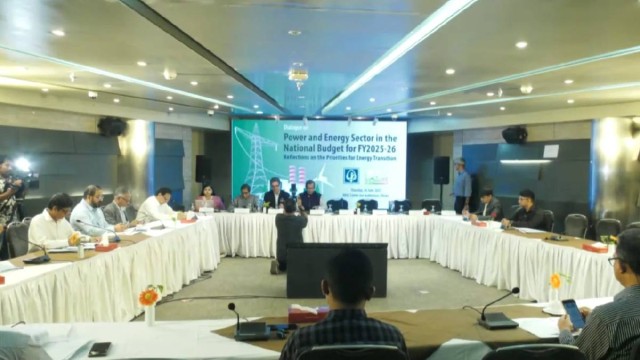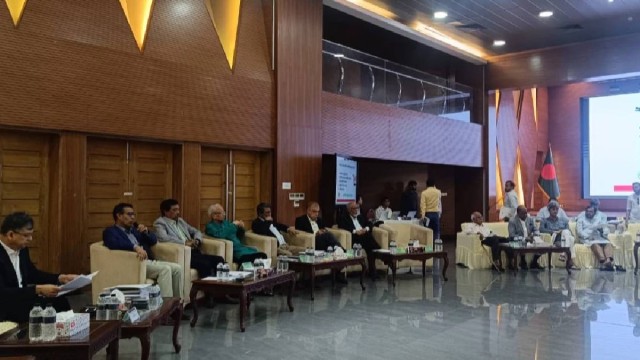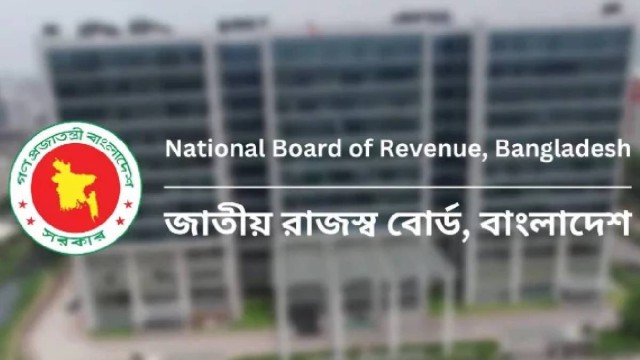১২ আষাঢ় ১৪৩২
CPD raises alarm over energy budget

Centre for Policy Dialogue (CPD) on Thursday raised serious concerns over Bangladesh’s proposed national budget for FY2025-26, warning that its fossil fuel-heavy focus threatens the country's clean energy transition and long-term sustainability.
Centre for Policy Dialogue (CPD) on Thursday raised serious concerns over Bangladesh’s proposed national budget for FY2025-26, warning that its fossil fuel-heavy focus threatens the country's clean energy transition and long-term sustainability.
These observations were made during a dialogue titled ‘Power and Energy Sector in the National Budget for FY2025-26: Reflections on the Priorities for Energy Transition’, held at BRAC Centre Inn in Mohakhali, Dhaka, reports UNB.
Energy Adviser Muhammad Fouzul Kabir Khan joined it virtually as chief guest.
The panel included CAB’s Professor Dr M Shamsul Alam, Professor Badrul Imam of Dhaka University, BGMEA Vice President Barrister Vidiya Amrit Khan, energy expert Monower Mostafa and BKMEA Vice President Md Akhter Hossain Apurbo.
CPD’s latest analysis warned that the energy budget undermines the government’s Three Zeros pledge – Zero Poverty, Zero Emission and Zero Unemployment, particularly the Zero Emission goal.
It highlighted that without urgent reforms, Bangladesh may fall further behind in its energy transition.
The budget, placed on June 2 and approved on June 22, is titled “Building an Equitable and Sustainable Economic System.” But CPD said it contradicts that vision by prioritising fossil fuels over renewables.
Key Challenges Highlighted
The study, led by Dr Khondaker Golam Moazzem and his team, identified several critical issues:
- Persistent Financial Losses: BPDB continues to face losses despite subsidies and tariff revisions, while profits by BPC and RPGCL often come at consumers’ expense.
- Rising Fiscal Burden: Power sector subsidies now account for 41% of the national total, with LNG import subsidies rising to Tk 9,000 crore for FY26.
- Overdependence on LNG: Domestic gas exploration is stagnant, and the Gas Development Fund is diverted to LNG imports.
- Mismatch Between Capacity and Supply: Despite growing capacity, outages persist due to inaccurate demand forecasts and fuel import limitations.
- Flawed Pricing Mechanism: The market-based fuel pricing model launched in March 2024 lacks transparency and is vulnerable to taxation and exchange rate shocks.
- Slow RE Progress: BPDB has failed to attract bidders for solar projects, and the cancellation of 37 LoIs has harmed investor confidence.
- Costly Debt: The government is relying on expensive short-term loans to pay dues, raising sustainability concerns.
- Policy Gaps: Key policies like the Integrated Energy and Power Master Plan (IEPMP) are under review, causing alignment delays.
- Deviation from Transition Goals: The budget’s emphasis on coal extraction and LNG imports signals a retreat from the Zero Emission commitment.
CPD’s Recommendations
- To realign with transition goals, CPD called for:
- Ending tax exemptions for fossil fuel power projects.
- Introducing carbon taxes and duties on fossil fuel plant imports.
- Withdrawing all fossil fuel and LNG subsidies.
- Prioritising domestic gas exploration using the Gas Development Fund.
- Phasing out inefficient power plants.
- Renegotiating unsolicited IPP contracts.
- Scaling up renewable energy in the ADP and cutting import duties and VAT.
- Creating a Renewable Energy Subsidy Fund.
- Investing in smart grids to support RE integration.
- Seeking low-interest MDB financing over short-term loans.
- Reviewing energy policies with the 2040 RE target in mind.
CPD said that the upcoming fiscal year will be a decisive test of the government’s resolve to uphold its climate and energy transition pledges.
END/RT/ED









Comments here: